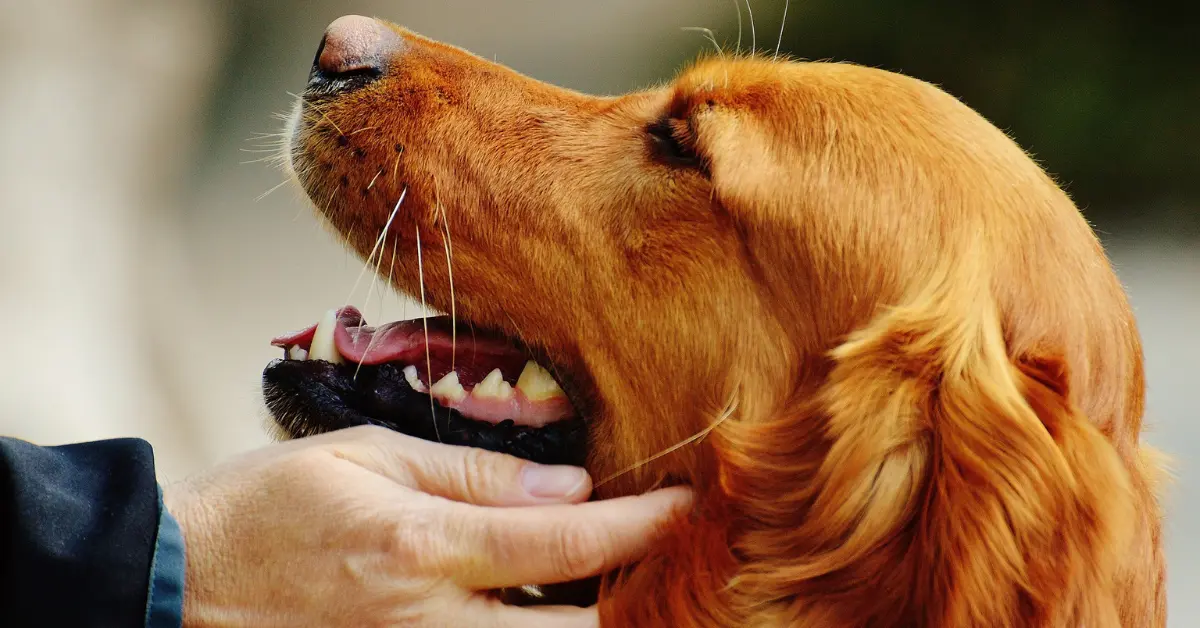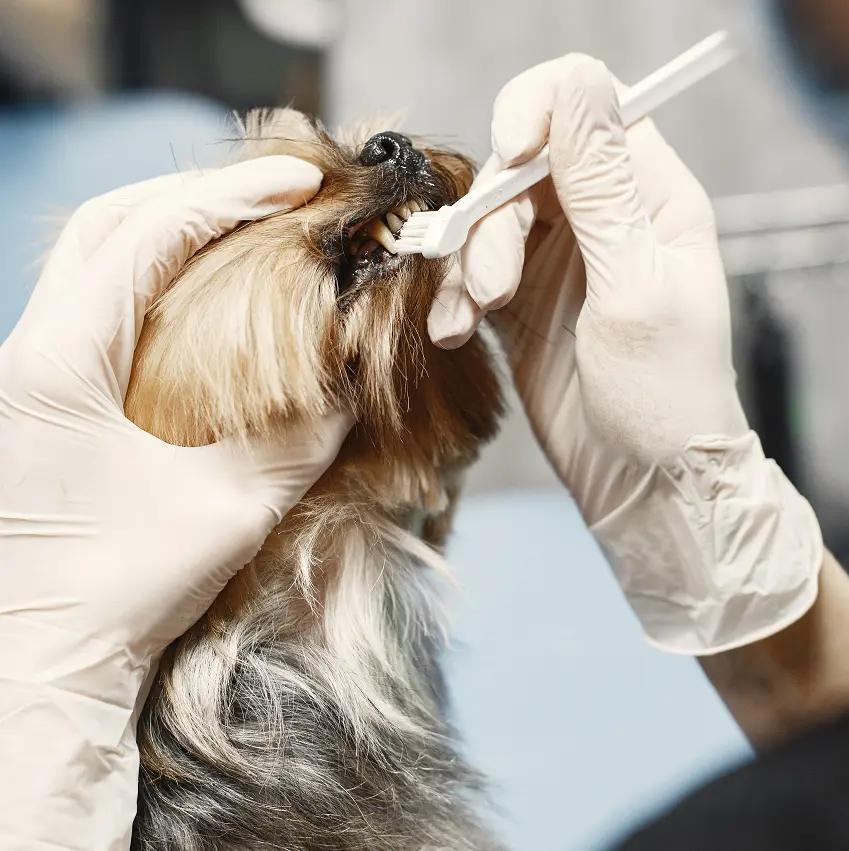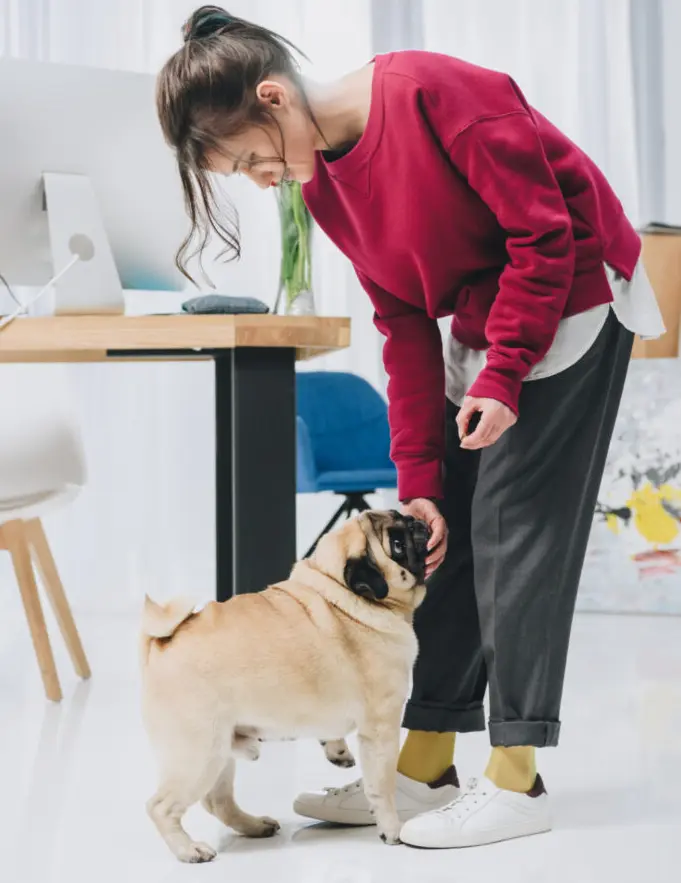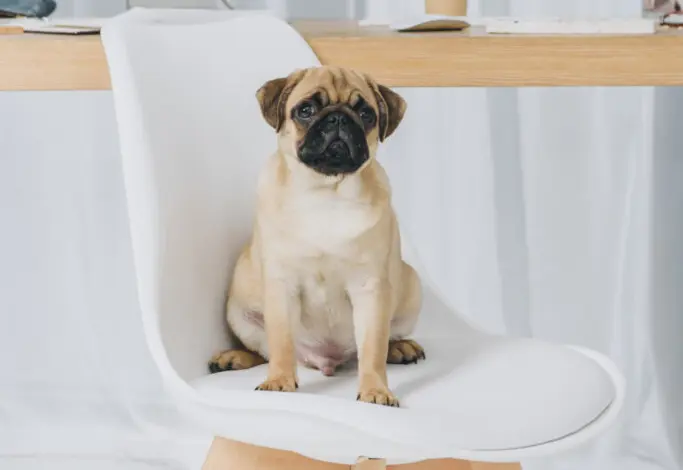Why Is My Dog Whining After Teeth Cleaning?
Dental care is very important for dogs, but many canines don’t take dental procedures quite well. In many cases, you’ll encounter a dog whining after teeth cleaning and similar treatments.
Like kids visiting the dentists, canines can be pretty scared when undergoing teeth cleaning. After all, the procedure isn’t completely pain-free, and being restrained can be pretty stressful.

So for this post, I will discuss the reasons behind this reaction among dogs and what you can do to comfort your pet after the procedure.
Is teeth cleaning necessary for dogs?

Regular teeth cleaning is as important to dog as with humans. Remember that dogs can develop dental problems as early as three years old.
Also, dogs put a lot of things in their mouth. This causes plaque buildup, which will damage and rot the teeth in the process.
Without proper dental cleaning, dogs will lose teeth prematurely. This is aside from bad breath, pain, and potential infections that may ensue due to neglected dental health.
Overall, the pain due to teeth cleaning is just a small sacrifice compared to the benefits your dog will receive. Regular dog teeth cleaning will also save you from hefty vet fees later due to dental problems.
Why do dogs whimper after teeth cleaning?
If your dog is whining after having its teeth cleaned, you shouldn’t panic right away. Most of the time, the reasons are the following:
The stress from anesthesia, discomfort, and being restrained for quite some time are considered normal. Also, owners of breeds like Siberian Husky, Bulldogs, Chihuahuas, and Foxhounds should ready their ears as these doggos can be pretty dramatic after a dental procedure.
Pain
Your dog is likely in pain after teeth cleaning. Its gums are probably sore and still need healing.
Sometimes, the vet won’t use anesthesia if your dog doesn’t require intensive cleaning. Still, this can cause discomfort on the gum line, which can be the explanation behind your pet’s whining.
On the other hand, your dog can still experience some level of pain once the anesthesia wears off.
Nevertheless, this pain is often mild and will go away after a day or two. However, if your pet’s pain seems to be getting worse, you may bring him to the vet immediately.
How to comfort dogs after dental cleaning

While canine dental cleaning is a minor procedure, some dogs won’t take it easy. With that, it’s important to comfort the pooch through these steps:
1. Switch to soft food
Dental cleaning can make your dog’s teeth sensitive and slightly painful. With this, you should switch to soft foods to ensure that the pooch can still eat properly.
If your dog is eating kibble, you can add hot water into the dry food to make it soft and soupy. Aside from eating, you should also encourage your dog to drink to help cleanse its mouth.
Expect your dog to have a poor appetite after teeth cleaning. With this, you should only serve small amounts of food at a time.
2. Postpone rigorous activities
Aside from softening its food, you should also postpone any activities of your dog. It’s essential to give your dog enough time to recover from the effects of anesthesia.
Let your dog sleep and rest for one to two days. After that, you can try coaxing the pooch with a toy or some treats to reintroduce physical activities.
3. Provide prescribed painkiller
It’s very important to administer the painkillers your dog’s veterinarian prescribed. This will spare your pet from the discomfort, and it will also help reduce whining.
Remember to follow the vet’s instructions about the dosage and timing of the painkiller. If your dog vomits or experiences diarrhea after taking the medication, you should contact the vet right away. Please read here: How To Clean Up Dog Vomit
4. Give cold treats
Ice cubes, frozen banana slices, and frozen carrot slices are great treats to soothe your dog’s gums. This can potentially reduce your dog’s whining after teeth cleaning.
You can also put your dog’s treats in the fridge to make it cold. Just give one piece at a time and see if your dog will have the appetite to eat.
5. Monitor for complications
Overall, teeth cleaning is fairly safe, and your dog must be good as new within two to three days. But to be sure, you should monitor your dog for any potential complications.
You should also pay closer attention if your dog is a brachycephalic breed like Bulldog, Pug, and Shih Tzu. This is because brachycephalic or flat-nosed dogs have a harder time recovering from anesthesia after a procedure.
6. Visit the vet for a check-up.
Depending on your dog’s recovery pace, you may need to bring it back to the vet for a check-up. This ensures that your dog is in good shape and that no complications have developed.
Nevertheless, most pet owners would opt to call the vet to update about the canine’s condition.
How long does it take for dogs to recover from dental cleaning?

For most dogs, it will take around two to three days for them to be back to normal after teeth cleaning. Some take a few more days, but that’s quite rare.
If your dog isn’t improving after three days, it’s best to call the vet. There might be something wrong with your dog that requires immediate veterinary attention.
Can dogs have their teeth cleaned without anesthesia?
Veterinarians can skip the anesthesia if your dog is cooperative and healthy. Also, the vet will do the same if the dog is at risk of complications.
However, for deep dental cleaning, veterinarians would opt for anesthesia. This is both for the dog and the vet’s safety since the procedure can scare even the most tolerant canine.
How much does dog dental cleaning cost?
This may surprise you, but canine dental cleaning actually costs a lot. On average, dental cleaning in dogs can set you back for around $300 to $700.
Aside from that, the clinic’s location, credentials of the vet, and inclusions of the procedure will impact the cost.
Still, the cost depends on the overall dental condition of your dog. Despite the cost, it’s still best to get your dog’s teeth cleaned regularly to avoid a more expensive procedure in the future.
How often should a dog’s teeth be professionally cleaned?
Similar to humans, dogs should have their teeth cleaned at least once a year. However, twice a year is advisable for dogs who are prone to plaque.
Take note that regular teeth cleaning will save your dog from various health problems. Also, it will spare you from expensive canine dental work.
Just because your dog’s teeth look clean doesn’t mean you’re going to skip routine cleaning. Remember, being proactive with your dog’s health is better than waiting for dental problems to occur.
Conclusion
Is your dog whining after teeth cleaning? Don’t worry because this is completely normal and should subside after a day or two.
The important thing is you help your pet remain comfortable as it recovers. Providing soft foods, letting it rest, and giving painkillers will reduce your pet’s discomfort.
You can also call the vet if you have questions or concerns after your dog’s teeth cleaning. You should do the same if your pet isn’t improving after several days.
